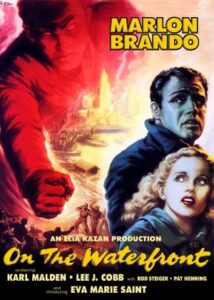ON THE WATERFRONT
 This classic story of Mob informers was based on a number of true stories and filmed on location in and around the docks of New York and New Jersey. Mob-connected union boss Johnny Friendly (Lee J. Cobb) rules the waterfront with an iron fist. The police know that he’s been responsible for a number of murders, but witnesses play deaf and dumb (“plead D & D”). Washed-up boxer Terry Malloy (Marlon Brando) has had an errand-boy job because of the influence of his brother Charley, a crooked unionlawyer (Rod Steiger). Witnessing one of Friendly’s rub-outs, Terry is willing to keep his mouth shut until he meets the dead dockworker’s sister, Edie (Eva Marie Saint). “Waterfront priest” Father Barry (Karl Malden) tells Terry that Edie’s brother was killed because he was going to testify against boss Friendly before the crime commission. Because he could have intervened, but didn’t, Terry feels somewhat responsible for the death. When Father Barry receives a beating from Friendly’s goons, Terry is persuaded to cooperate with the commission. Featuring Brando’s famous “I coulda been a contendah” speech, On the Waterfront has often been seen as an allegory of “naming names” against suspected Communists during the anti-Communist investigations of the 1950s. Director Elia Kazan famously informed on suspected Communists before a government committee — unlike many of his colleagues, some of whom went to prison for refusing to “name names” and many more of whom were blacklisted from working in the film industry for many years to come — and Budd Schulberg’s screenplay has often been read as an elaborate defense of the informer’s position. On the Waterfront won Oscars for Best Picture, Best Director, Best Adapted Screenplay, Best Actor for Brando, and Best Supporting Actress for Saint. ~ Hal Erickson, Rovi
This classic story of Mob informers was based on a number of true stories and filmed on location in and around the docks of New York and New Jersey. Mob-connected union boss Johnny Friendly (Lee J. Cobb) rules the waterfront with an iron fist. The police know that he’s been responsible for a number of murders, but witnesses play deaf and dumb (“plead D & D”). Washed-up boxer Terry Malloy (Marlon Brando) has had an errand-boy job because of the influence of his brother Charley, a crooked unionlawyer (Rod Steiger). Witnessing one of Friendly’s rub-outs, Terry is willing to keep his mouth shut until he meets the dead dockworker’s sister, Edie (Eva Marie Saint). “Waterfront priest” Father Barry (Karl Malden) tells Terry that Edie’s brother was killed because he was going to testify against boss Friendly before the crime commission. Because he could have intervened, but didn’t, Terry feels somewhat responsible for the death. When Father Barry receives a beating from Friendly’s goons, Terry is persuaded to cooperate with the commission. Featuring Brando’s famous “I coulda been a contendah” speech, On the Waterfront has often been seen as an allegory of “naming names” against suspected Communists during the anti-Communist investigations of the 1950s. Director Elia Kazan famously informed on suspected Communists before a government committee — unlike many of his colleagues, some of whom went to prison for refusing to “name names” and many more of whom were blacklisted from working in the film industry for many years to come — and Budd Schulberg’s screenplay has often been read as an elaborate defense of the informer’s position. On the Waterfront won Oscars for Best Picture, Best Director, Best Adapted Screenplay, Best Actor for Brando, and Best Supporting Actress for Saint. ~ Hal Erickson, Rovi